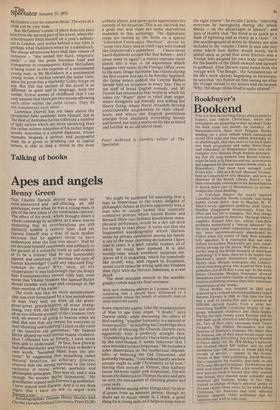Bookbuyer's
Bookend
Why is it that the exciting things always seem to happen just before Christmas, when the newspapers are preparing to shut up shop? Take the book trade last month, for instance. At Harmondsworth there were Penguin Books sending out a press release which announced record 1974 sales and then added, seemingly as an afterthought, that they were to cut back their new book programme and make thirty-three staff redundant. In Westminster there was the energetic Arts Minister Hugh Jenkins announcing that the long-awaited new British Library might be built in St Pancras and not, as everyone had supposed for the last twenty-seven years, in Bloomsbury. That must have enraged Lord Eccles who — first as a British Museum Trustee, then as Conservative Arts Minister, and now as chairman of the British Library Board — has been remarkably consistent in his determination to knock down part of Bloomsbury to accommodate the Great Building.
In Trafalgar Square the newly opened Canadian bookshop 'Books Canada' was being quietly closed down. And in Mayfair W. H. Allen's newly appointed publicity chief Gwyn Headley disappeared mysteriously from his office and has yet to reappear. Not that things were much quieter in America. The large library suppliers Richard Abel Inc., whose cash-flow problems necessitated a "rescue takeover" by the even larger Follett corporation two months ago, were unceremoniously abandoned by Follett when the extent of their flow became fully apparent. It is rumoured that our own Oxford booksellers Blackwell's are now considering picking up the pieces. Will this mean a further step in the British invasion of American publishing? If it does, then let it be hoped that Blackwell's acquit themselves with greater dignity than Morgan Grampian, the London. based publishing group who acquired New York publishers David McKay a year ago. In the week before Christmas, Morgan Grampian showed themselves even more capable of disturbing the creative publishing process than their American counterparts of the 'sixties. David McKay was founded in 1883 and acquired by a civilised American publisher called Kennett Rawson in 1950. At that time the firm had a staff of twenty-five and a turnover of $350,000 derived mostly from a solid but unexciting backlist consisting largely of language, reference, children's and chess books. During the next twenty years Rawson and his wife built up an attractive and thriving general list. Two of their early successes were Vance Packard's The Hidden Persuaders and the Duchess of Windsor's memoirs The Heart Has Its Reasons; one of their more recent coups was David Reubens'Everything You Always Wanted to Know About Sex. By 1970 McKay's turnover had reached about $10 million and its staff numbered over 100, several of whom had long records of service — indeed, in the stormy climate of NeW York publishing, David McKay had a reputation for stability. And then, in late 1973, came Morgan Grampian. The Rawsons and their staff stayed on. Within a few months their new masters made it known that they wanted less fiction; they wanted more scientific and technical and business books; in fact they wanted to change McKay's editorial policy of the past twenty-three years. In the week before Christmas, the Rawsons and their editorial director resigned. Other publishers ripe for takeover may wish to take note.


























 Previous page
Previous page